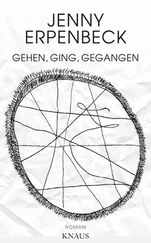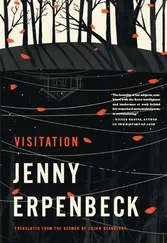Jenny Erpenbeck - The End of Days
Здесь есть возможность читать онлайн «Jenny Erpenbeck - The End of Days» весь текст электронной книги совершенно бесплатно (целиком полную версию без сокращений). В некоторых случаях можно слушать аудио, скачать через торрент в формате fb2 и присутствует краткое содержание. Год выпуска: 2014, Издательство: New Directions Publishing, Жанр: Современная проза, на английском языке. Описание произведения, (предисловие) а так же отзывы посетителей доступны на портале библиотеки ЛибКат.
- Название:The End of Days
- Автор:
- Издательство:New Directions Publishing
- Жанр:
- Год:2014
- ISBN:нет данных
- Рейтинг книги:4 / 5. Голосов: 1
-
Избранное:Добавить в избранное
- Отзывы:
-
Ваша оценка:
- 80
- 1
- 2
- 3
- 4
- 5
The End of Days: краткое содержание, описание и аннотация
Предлагаем к чтению аннотацию, описание, краткое содержание или предисловие (зависит от того, что написал сам автор книги «The End of Days»). Если вы не нашли необходимую информацию о книге — напишите в комментариях, мы постараемся отыскать её.
The End of Days — читать онлайн бесплатно полную книгу (весь текст) целиком
Ниже представлен текст книги, разбитый по страницам. Система сохранения места последней прочитанной страницы, позволяет с удобством читать онлайн бесплатно книгу «The End of Days», без необходимости каждый раз заново искать на чём Вы остановились. Поставьте закладку, и сможете в любой момент перейти на страницу, на которой закончили чтение.
Интервал:
Закладка:
Later he leaves the café in his own company, meaning to stroll for a little while before his appointment that isn’t until the afternoon, they’re selling horse meat at the Naschmarkt, herbs, apples, and flowers; he promenades across the square then strolls across to the Rechte Wienzeile; it’s still too early in the day for the porn cinema there, he has no desire to desire anything, blindly he strolls down a side street, makes a right turn without a plan, and onward: streetcar tracks, the entryways of the buildings giving off a smell of quicklime and dust as though it were summer already, he passes grimy shop windows, walking ever farther down this street. He’s happy not to have to go look at anything a foreigner in Vienna is supposed to see, he likes walking like this through everyday reality. In a spot where a very long time ago an angel kept watch over a building’s front entrance, the low building no longer stands, instead there’s a modern five-story hotel. Indeed, the building where his great-grandmother once lived fell victim to one of the few bombs dropped in the final days of the war, in March 1945, but by then his great-grandmother had already been dead for more than four years, her apartment had been emptied out and passed on to others. But he knows neither who his great-grandmother was, nor where she lived, he steps to one side when the revolving door deposits a group of tourists onto the sidewalk. As far as this descendent of a Viennese resident is concerned, Vienna has been washed clean of stories, it took less than a human lifetime for the city to lose all connection to him. Less than a human lifetime for homeland and origins to diverge. He is free, doubly free; he carries around within him a vast dark land: all the stories his mother never told him or that she hid from him; perhaps he carries with him even those stories his mother never knew or heard of, he can’t get rid of them, but he can’t lose them either, since he doesn’t even know them, since all of this lies buried deep within him; for when he slipped from his mother’s womb, he was already filled with interior spaces that didn’t belong to him, and he can’t just look inside to inspect his own interior. His father once spent three weeks in Berlin almost forty years ago, but he didn’t know about it, how could he have? His father later spent an eternity living in Vorkuta, and twelve years ago he died there, but the son knows neither of these things. The son can make his home anywhere in the world, in Berlin for example. If he knew what questions to ask, knew what, where, and to whom, then an official of the Jewish Community of Vienna would surely be able to dig up one or the other list and inform him that his great-grandmother was brought to Opole in the district of Lublin with the first transport of February ’41, that his grandmother moved six times within Vienna and then was sent via Minsk to Maly Trostenets in July ’42, and that his aunt spent many months hiding in a friend’s apartment and then was sent in ’44 to Auschwitz. But given what he knows, he finds Vienna just as dusty as any other metropolis. Kettenbrückengasse, Mariahilfer Strasse, Siebensterngasse, Mondscheingasse. There on the otherer side, as his mother would say, is a second-hand shop; who knows, maybe he’ll find something here that he can bring her.
The miniature grandfather clock, standing on a shelf beside the entryway, is just striking ten with tinny strokes, although he knows it has to be at least 11:30 by now. All around he sees tables and cabinets, chairs with woven seats, stools and ottomans, glass cases with jewelry tangled in old silverware; lamps dangle from the ceiling, and the walls are hung with oil paintings, mirrors, barometers, crucifixes, and trays that once held movable type; shelves bear candelabras, plates, books, and glasses, and under the tables are wooden buckets and baskets filled with linens. Everything is squeezed in tightly together, each object casting its shadow on the next, so that, even on this bright May day, the room lies in its own twilight. At first the man cannot make out a seller, and no one speaks to him in greeting; only after his eyes have become accustomed to the low light does he see a man sitting in an armchair off in the back, immersed in a book.
What might please his mother? His mother who didn’t want to take anything when she moved to the rest home but the yellow wall hanging with its Uzbek sun, the small dark-blue suitcase, whose contents are unknown to him, and the little box with the gold buttons. He wouldn’t mind acquiring this set of Goethe’s writings for his own use — the final authorized edition, surprisingly complete with all its volumes — that no doubt costs less here than at an antiquarian bookshop. At random he pulls out Volume 9, the spine of which is a bit scraped, and leafs through it; he reads “Farewell,” then puts the book back in its place. How can he carry an entire Goethe edition on the train to Berlin? A brooch set with amethysts might be nice, or a silver spoon with the Vienna city arms, but he doesn’t feel like asking the shopkeeper to open the glass case. Finally he sees a miniature double portrait leaning up against a Meissen soup tureen, a double portrait of Prussian Kaiser Wilhelm II and Kaiser Franz Joseph as allies, In Steadfast Loyalty is written on the picture, and since his Viennese mother has wound up in Prussia, he thinks it might work, the piece’s political context now lying far in the past; he takes the picture from the shelf, approaches the man and asks: Excuse me, how much?
4
The owner of the Goethe edition and the clock is already nearly eighty when she has to leave everything behind, and in February ’41, leaning on her cousin’s arm, she begins her journey to the Jewish Home for the Aged on Malzgasse, which, for the sake of convenience, has been designated the first collection point for deportations to the East. The clock strikes eleven, the clock strikes twelve, Morning wind wings about the shady bay , then her cousin returns to the empty apartment. He sits for a while at the table, where a moment ago he shared a last cup of tea with the old woman. Es vert mir finster in di oygn, everything’s going black before my eyes. Then the clock strikes one. The old woman was forced to turn in her seven-armed candelabra the year before, for the metal collection. It’s surely long since been melted down. But the Goethe edition at least: the man now packs it up, grabbing three or four volumes at a time, in the very suitcase in which he transported it twenty years before on his cart. He removes the pendulum from the clock, wrapping the clock in a pillowcase and tying it up to make a package that he can put in a coal sack and hang over his shoulder. With suitcase and sack he leaves the apartment, which has grown completely cold, a thin sheet of ice has already formed on top of the water in the bucket. If he hadn’t slipped the clock’s pendulum into the breast pocket of his jacket, he’d think he was still hearing the clock ticking right through the sack and the soft fabric, as though he were hearing it through snow, he could swear the clock’s hands were still moving behind his back. After all, before the old lady started on her journey to Malzgasse, she had wound the clock one last time, just as she had done every morning for the last fifty years. With the stopped clock on his back, the old woman’s cousin walks through the February cold, the pendulum peeking out of his breast pocket with its delicate little hook, and the key to wind it is in his trouser pocket, where it is slowly growing warm. The cousin walks to the neighborhood around Arenbergplatz, rings a doorbell, speaks with someone, nods, then takes the streetcar to Mariahilfer Strasse 117, rings the bell, speaks, nods, then heads to Linzer Strasse 439, rings, speaks; Haidgasse 4, and finally he finds himself standing on Dampfschiffstrasse 10/6 in District II before a door, he rings the bell, speaks, and here he is finally relieved of his burden that has now become an inheritance, a reminder to the woman answering of something she doesn’t want to be reminded of, objects speak without speaking, and the woman now knows something she didn’t want to know: that there is a moment when it is forever too late. Last of all, the now-warm key from the cousin’s trouser pocket — oh, right — and the pendulum. The woman takes the key, pendulum, suitcase, and the coal sack, and carries them to a room belonging to her only in part, strangers are sitting there on beds, strange children playing under the table, strangers quarreling, and here — as if all these things had nothing to do with her — she takes the packet out of the sack, unwraps it, places the clock on the table, hooks the pendulum in its place, and already the clockwork begins ticking again, her mother’s life is still there in the tightly wound spring; she shoos a few children away, sits down in front of the clock, and watches as time — which is now forever too late — passes. Time is like a briar that has gotten caught in wool, you tear it out with all your strength and throw it over your shoulder. Minutes pass that no longer matter, cleanly divided by the minute hand one from the next.
Читать дальшеИнтервал:
Закладка:
Похожие книги на «The End of Days»
Представляем Вашему вниманию похожие книги на «The End of Days» списком для выбора. Мы отобрали схожую по названию и смыслу литературу в надежде предоставить читателям больше вариантов отыскать новые, интересные, ещё непрочитанные произведения.
Обсуждение, отзывы о книге «The End of Days» и просто собственные мнения читателей. Оставьте ваши комментарии, напишите, что Вы думаете о произведении, его смысле или главных героях. Укажите что конкретно понравилось, а что нет, и почему Вы так считаете.












